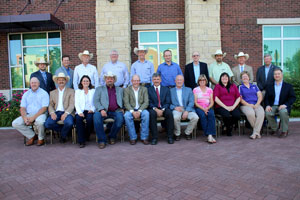K-State animal sciences and industry department hosts BIF annual meeting and research symposium
 Photo and caption available
Photo and caption available
Released: June 23, 2016
MANHATTAN, Kan. — More than 600 beef industry producers, leading geneticists and allied industry professionals were in Manhattan, Kansas, last week for the 2016 Beef Improvement Federation (BIF) Annual Meeting and Research Symposium. Themed "Progress on the Prairie," the event was hosted by the Kansas State University Department of Animal Sciences and Industry June 14-17.
The annual forum brings together members of the industry and research community to discuss issues related to the genetic improvement of beef cattle. Convention attendees learn about technologies and management practices that can enhance the profitability of beef cattle production.
Attendees included 615 seedstock and commercial beef producers, academic and extension professionals, and allied industry participants from 38 states, as well as 34 attendees from four foreign countries, including Australia, Argentina, South Africa and Canada.
This year's BIF symposium featured two and a half days of educational programming and a full day of tours that visited previous BIF Seedstock and Commercial Producer of the Year winners.
"Speakers at this year's BIF conference did a great job outlining the international and domestic opportunities for participants in the beef value chain moving forward through genetic improvement in end-product attributes," said Bob Weaber, K-State associate professor and extension cow-calf specialist. "They also highlighted the strengths and challenges of our cow-calf sector and pointed to areas where genetic improvement offers the opportunity to protect and enhance producer profits."
The first morning's general session – "Opportunities for the Beef Value Chain: Can We Become More Coordinated and More Profitable?" – featured K-State's Ted Schroeder and Glynn Tonsor; John Stika, Certified Angus Beef LLC; Brad Morgan, Performance Food Group; and Keith Belk, Colorado State University. Speakers during Thursday's general session, "Protecting Producer Profit for the Future," were David Lalman, Oklahoma State University; Chip Ramsay, Rex Ranch; Mark Enns, Colorado State University; and Clay Mathis, King Ranch Institute for Ranch Management.
During his conference wrap-up, Kent Andersen, Zoetis director of genetics for cattle and equine technical services, summarized the need for a stronger beef chain: "The beef chain is no stronger than the weakest link. We have to move from divided and fragmented to united and integrated systems. We have to focus on the complete supply chain with the consumer in mind."
Other take-home messages he shared related to the end product included the need to build trust through transparency; brand and story does matter; and the need for signals for pull-through because of industry fragmentation.
Summarizing the Thursday general session, he explained the need for whole-system optimization from the cow-calf producer to the feeder to the packer and the consumer. He also stressed it is dangerous for the cow-calf producer today to ignore post-weaning traits, and he highlighted the need to put more pressure on "cost" traits.
"Indexes do work," Andersen said.
He challenged attendees to remember the three Cs – consumers, costs and communication. He encouraged producers to keep tabs on "consumers" and focus on meeting their needs, to keep an eye on "costs," and strive to efficiently "communicate" between all segments of the beef supply chain.
Conference proceedings are posted to the K-State ASI app, and website. For more information about this year's symposium, including award winners and coverage of the meeting and tours, visit BIFconference.com. For more information about BIF, visit Beefimprovement.org.
-30-
K-State Research and Extension is a short name for the Kansas State University Agricultural Experiment Station and Cooperative Extension Service, a program designed to generate and distribute useful knowledge for the well-being of Kansans. Supported by county, state, federal and private funds, the program has county Extension offices, experiment fields, area Extension offices and regional research centers statewide. Its headquarters is on the K-State campus in Manhattan.
Story by:
Angie Stump Denton, communication coordinator, Kansas State University Department of Animal Sciences and Industry
785-562-6197 or angiedenton@ksu.edu
